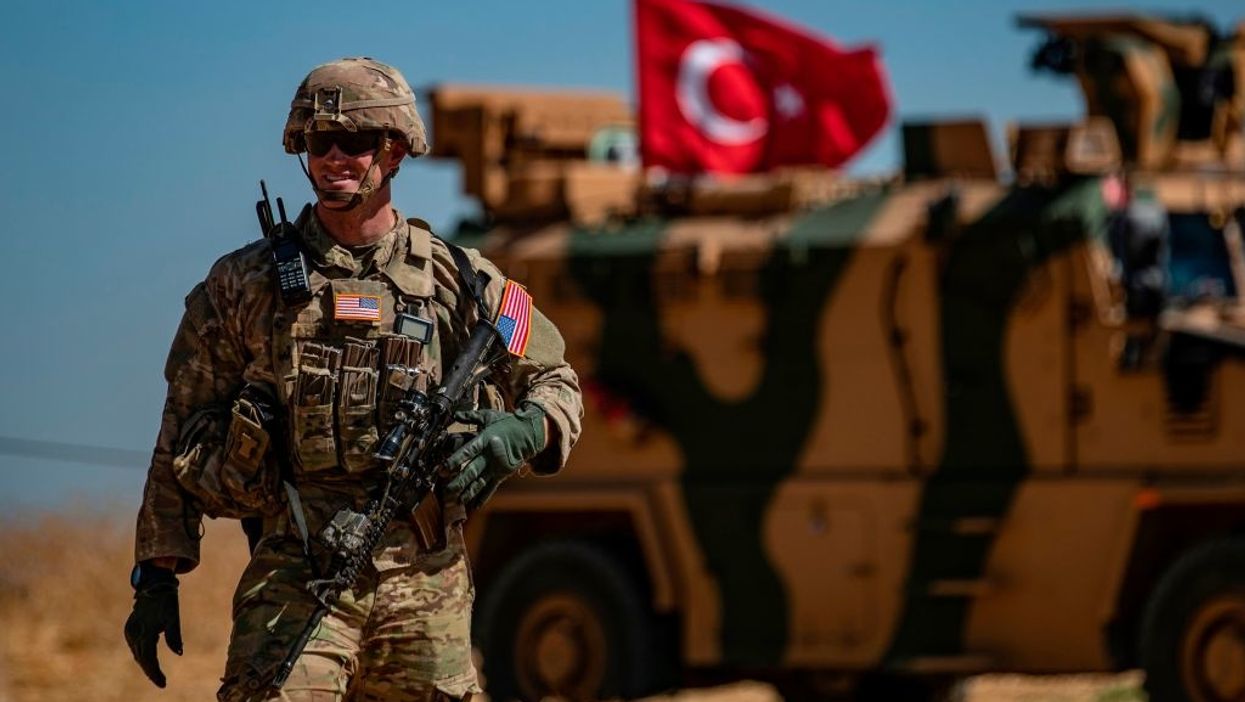
DELIL SOULEIMAN/AFP via Getty Images

President Trump wanted the U.S to withdraw troops from Syria. We never did.
An outgoing U.S. diplomat admitted in a recent interview with Defense One to lying to President Donald Trump and other senior administration officials about the true number of U.S. troops deployed in Syria in an effort to dissuade the president from withdrawing U.S. forces from the region.
Retiring Ambassador Jim Jeffrey, the U.S. special envoy for Syria, said that for years his team outright misled the Trump administration about troop levels deployed in the region.
"We were always playing shell games to not make clear to our leadership how many troops we had there," Jeffrey told Defense One. He admitted that the actual number of U.S. military forces in northeast Syria is "a lot more than" the roughly 200 troops Trump agreed to station there in 2019.
In 2018, President Trump announced that the United States had defeated ISIS in Syria and subsequently declared that U.S. forces would be withdrawn from the region. At the time, more than 2,000 troops were stationed in the region. His declaration was met with opposition from several national security officials, the media, and even some Republican lawmakers, such as Sens. Lindsey Graham (S.C.) and Marco Rubio (Fla.). Trump's decision prompted Secretary of Defense Jim Mattis to resign.
Jeffrey described the announcement as "the most controversial thing in my fifty years in government."
Trump's policy change was ultimately reversed after Jeffrey and his team convinced the president to keep a residual force in Syria to prevent ISIS from regrouping and keep Russia and Syria from expanding their territory.
"What Syria withdrawal? There was never a Syria withdrawal," Jeffrey said. "When the situation in northeast Syria had been fairly stable after we defeated ISIS, [Trump] was inclined to pull out. In each case, we then decided to come up with five better arguments for why we needed to stay. And we succeeded both times. That's the story."
Trump reportedly agreed to keep somewhere between 200 and 400 troops in Syria, but anonymous sources who spoke to Defense One say there are closer to 900 U.S. troops serving in Syria today. The exact figure is classified and it would seem not even the president of the United States, the commander-in-chief of the armed forces, knows how many troops are stationed there.
CNN chief national security correspondent Jim Sciutto's reporting corroborated Jeffrey's claims, tweeting that senior Department of Defense officials who spoke with him for his book, "The Madman Theory" explained how they "fooled" Trump into leaving troops deployed in Syria.
Jeffrey, a career bureaucrat, began his service in the Trump administration as an opponent of the president. He was one of several U.S. national security officials who signed a letter in 2016 declaring their opposition to Trump's candidacy for president.
"I know what I did in 2016, I do not disagree with that," said Jeffrey. "I was following closely the situation with Iran, Iraq and Syria, and I was appalled that we didn't have a more coherent policy. This wasn't a political decision."
He now believes that Trump's Middle-East policy has actually improved the region and he hopes that former Vice President Joe Biden will continue Trump's policies should he ultimately prevail in the 2020 election.
"Nobody really wants to see President Trump go, among all our allies [in the Middle East]," he said. "The truth is President Trump and his policies are quite popular among all of our popular states in the region. Name me one that's not happy."